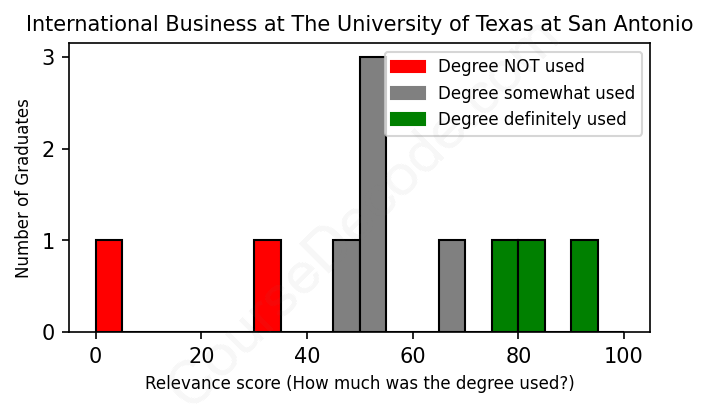
First, some facts. Of the International Business graduates from The University of Texas at San Antonio we've analyzed , here's how many have used (or NOT used) their degree in their career:

These are estimates based on AI analysis of 10 LinkedIn profiles (see below).
The verdict? Significantly below average. Overall, with an average relevance score of 55%, International Business graduates from The University of Texas at San Antonio have a much lower likelihood (-12%) of finding work in this field compared to the average graduate across all fields:
And for comparison, here's the chart for all profiles we've looked at across all degrees.
Also, after graduating, 50% of these graduates have pursued further education other than another Bachelor's degree (such as a Masters degree or other), compared to the average across all profiles of 35%. This suggests you may need more than just a Bachelors degree to be competitive as a International Business graduate.
See the details:
|
Relevance score: 68% We think this person has gone into a career only somewhat relevant to their degree. We think this person has gone into a career only somewhat relevant to their degree.
DEGREE INFOGraduated in 2015 from The University of Texas at San Antonio with a Bachelor of Business Administration (B.B.A.) in International Business. Also pursued further education since (see below). JOB HISTORY SINCE GRADUATIONClient Services Manager Sawtelle Financial Management, LLC May 2015 - Jan 2017 Private Client Administrator  AllianceBernstein Feb 2017 - Jul 2019 Relationship Manager  Exencial Wealth Advisors Jul 2019 - Present FURTHER DEGREES DONE SINCE GRADUATINGMaster of Business Administration - MBAThe University of Texas at San Antonio 2022 - 2024 ABOUTNo information provided. |
The top 10 most common jobs done by the graduates we've analyzed (ranked most common to least) are:
When looking at the job histories of graduates from the International Business program at the University of Texas at San Antonio, it seems like many of them end up in roles that don’t necessarily leverage their degree’s specific knowledge. A lot of the positions, such as Temp Associate Registrar and various roles in customer service and sales, really focus more on general administrative or clerical tasks rather than international business concepts. Even roles that sound relevant, like Management Consultant or Client Services Manager, often miss the mark when it comes to using specialized knowledge from their studies. This suggests that while these jobs may share some skills or transferable aspects with International Business, they aren't directly tied to the international market or global business strategies.
On the other hand, there are exceptions where graduates do tap into their international business knowledge more significantly, especially in roles like International Business Development Manager or Supply Chain Analyst. These positions specifically deal with global markets and supply chains, indicating a stronger connection to what they studied. However, overall, it looks like a good chunk of graduates navigate towards roles that don’t fully utilize the skills and concepts from their International Business degree. So, while there's potential for applying that knowledge, many end up in jobs that just don’t match the international scope of their education.
Here is a visual representation of the most common words in job titles for International Business graduates (this is across all International Business graduates we've analyzed, not just those who went to The University of Texas at San Antonio):

Looking at the career trajectories of graduates from the University of Texas at San Antonio with a degree in International Business, there seems to be a mix of success stories and a few paths that veered off into less relevant industries. For many, the initial job after graduating often tends to be in roles that are somewhat entry-level or unrelated to international business, like administrative or customer service positions. For instance, some started as temp employees or in roles like supply chain analysts and customer service representatives. This suggests that while they may have aimed for something more aligned with their studies, they found themselves taking on roles that were more accessible as recent grads.
Fast forward a few years, and the picture starts to change for many. A number of graduates have moved into more specialized roles, especially within marketing or management, indicating that they found their footing and made progress in their careers. Roles such as International Business Development Manager and Senior Manager show that some have moved into management positions that leverage their education. However, it’s important to note that some professionals remain in positions that might not fully utilize their international business background, like warehouse clerks or customer service roles over a longer period. Overall, while some graduates are thriving in relevant fields, others appear to be stuck in jobs that don't directly connect to their degree, which paints a rather mixed picture of their career outcomes.
Honestly, a Bachelor’s degree in International Business can be a bit of a mixed bag in terms of difficulty. At The University of Texas at San Antonio, you'll probably find some classes to be fairly manageable, especially if you've got a knack for subjects like economics and marketing, but there can be a decent amount of group projects and case studies that might stretch your teamwork skills. You'll also need to stay on top of global trends and cultural insights, which can be a lot of info to juggle. Overall, it’s not one of the toughest degrees out there, but it definitely requires consistent effort and some good time management to keep everything balanced. So if you’re willing to put in the work, you should be just fine!
Most commonly, in the LinkedIn profiles we've looked at, it takes people 4 years to finish a Bachelor degree in International Business.
Looking at the job history of these International Business grads from UTSA, it seems like there is quite a mix when it comes to their earnings potential. The graduate from 2012 has been hopping around lower-level jobs, which likely means they aren’t raking in much cash, while the 2013 grad quickly climbed the ladder to a senior management position, probably pulling in a pretty decent salary now. The 2014 batch shows a blend too; some have reached managerial roles, which can be lucrative, while others seem to be in more entry-level spots still. It’s clear some are doing better than others financially—those in consulting and management roles seem to have seized solid opportunities, while others are still building up their careers. So, all in all, if you're aiming for a comfortable salary after graduation, it might depend on the path you choose and how quickly you can climb that ladder!
Here is a visual representation of the most common words seen in the "about" section of LinkedIn profiles who have a Bachelor degree in International Business (this is across all International Business graduates we've analyzed, not just those who went to The University of Texas at San Antonio). This may or may not be useful:

Here are all colleges offering a Bachelor degree in International Business (ordered by the average relevance score of their International Business graduates, best to worst) where we have analyzed at least 10 of their graduates:
| College | Score | Count |
|---|---|---|
 Florida International University - College of Business Florida International University - College of Business
|
67 | 13 |
 Berkeley College Berkeley College
|
62 | 11 |
 Rollins College Rollins College
|
61 | 10 |
 University of North Florida University of North Florida
|
59 | 10 |
 University of California San Diego University of California San Diego
|
59 | 10 |
 The University of Texas at San Antonio The University of Texas at San Antonio
|
55 | 10 |
 Florida International University Florida International University
|
54 | 32 |
 San Francisco State University San Francisco State University
|
49 | 16 |
 The University of Memphis The University of Memphis
|
49 | 10 |